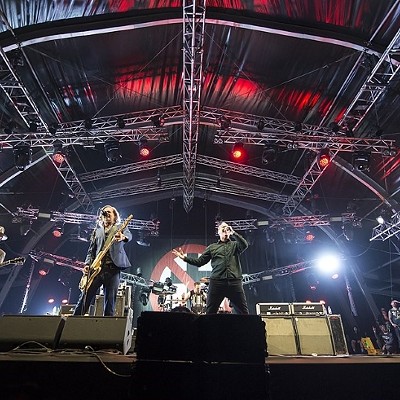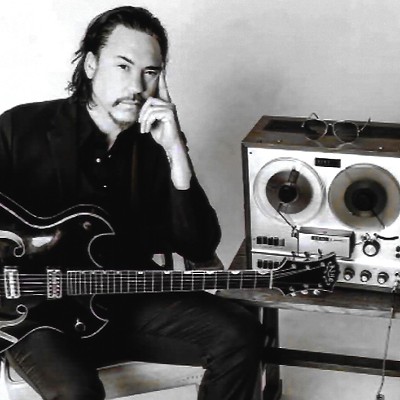Houston's Don Deadric Robey -- half black, half Jewish, all gangster -- beat Berry Gordy by ten years to become the first African-American record mogul. A gambler and a hustler, he did not get there by playing fair, but Robey put out some of the greatest gospel, R&B and rock and roll records of the 1950s and '60s from a building in the Fifth Ward. As Stax would later define Memphis grit, Duke/Peacock was raw, black Southern music for an audience more into jubilation than assimilation.
The 2809 Erastus Street address housed Robey's sophisticated Bronze Peacock Dinner Club from 1945 to '53, and in a back office he launched Peacock Records in 1949 after his discovery Clarence "Gatemouth" Brown didn't get much promotion on two singles for L.A.'s Aladdin label. Peacock first made its name in the gospel field, then hit it big in R&B in 1953 with Big Mama Thornton's "Hound Dog," predating the sensational Elvis Presley cover by three years.
After he acquired the Duke label in the early '50s, Robey's stable of acts contained not only Gatemouth, but Bobby "Blue" Bland, Junior Parker, Johnny Ace, Roscoe Gordon, Memphis Slim, Johnny Otis, Big Walter and the Thunderbirds and O.V. Wright.
Robey's Peacock Records originally released Clarence "Gatemouth" Brown's "Okie Dokie Stomp" in 1954Robey's empire included the Buffalo Booking Agency, run by the irreplaceable Evelyn Johnson, which repped many black entertainers out on the "chitlin circuit" and gospel highway. Robey insisted that his acts tour incessantly and if they had jobs they couldn't leave, like Austin's Bells of Joy in 1951, he sent out singers to pose as them. As a one-stop operation, Robey got a piece of everything and used strong-armed intimidation to make negotiations go his way.
"He might've ripped me off," Gatemouth Brown told me in 2005, "but if it wasn't for Don Robey, nobody would've ever heard of me."
Such sentiments fueled impresario greed across the board in the music business at the time. Getting paid to do something you love was a novel concept after the Depression and WWII. What was important was that Robey allowed musicians to make records, and the style didn't matter as long as people were buying them. Robey had five labels in all, including Back Beat (Roy Head's "Treat Her Right" in '65) and Song Bird ("Lord Don't Move the Mountain" by Inez Andrews in '73).
As the label of the Five Blind Boys of Mississippi and the Sensational Nightingales, led by the volcanic housewreckers Archie Brownlee and Julius Cheeks, respectively, Peacock was primarily known in its early years as the home of hard gospel. Add the Dixie Hummingbirds from South Carolina, the Spirit of Memphis Quartet, Pilgrim Jubilee Singers from Chicago, Rev. Cleothus Robinson from Mississippi, Sister Jessie Mae Renfro of Waxahachie, the Christland Singers with R.H. Harris and the Brooklyn All-Stars and Peacock had as heavenly a roster as there was.
Chicago was still the headquarters for black gospel music, but because of Robey's label and booking agency, Houston was gospel's second in command.
It all started with the Five Blind Boys of Mississippi, whose fame has been surpassed by their Alabama counterparts in recent years. But back in the heyday, "The Five Blind Boys" referred to the guys who formed at the Piney Wood School for the Blind near Jackson, Miss. Besides shoutmaster Brownlee, the original group, which was recorded by Alan Lomax in 1937 as the Cotton Blossom Singers, included tenor Lawrence "Shorty" Abrams, baritone Lloyd Woodard and bass singer Joseph Ford (replaced by J.T. Clinkscales in the late '40s).
After school, the group began singing professionally as the Jackson Harmoneers and moved to New Orleans for better opportunities. There, they picked up fifth member Percell Perkins and recorded obscure singles for the Excelsior and Coleman labels. Booked in New Jersey with another blind group, a promoter billed the concert as a battle between the Blind Boys of Mississippi and the Blind Boys of Alabama -- and both acts ended up keeping the new names.
Story continues on the next page.
On tour in Houston in 1950, the Mississippi Boys met Robey, who decided he could sell some gospel records by adding a drum beat to quartet singing. While the first session with the "Original Five Blind Boys" did not produce a hit, the second session created a monster with "Our Father." That intensifying of The Lord's Prayer, over a repetitive bass drum, validated Robey's vision by being the first black gospel record to hit the jukebox. Before that, almost all quartet records were a cappella. After "Our Father" hit, almost none were.
Robey required all his studio drummers to follow the beat of a red light in the studio that simulated the rhythm of a human heart. Austin gospel group the Bells of Joy had a huge hit in 1951 following that Robey formula on "Let's Talk About Jesus." The lyrics were written by Lavada Durst, the KVET disc jockey who'd just recorded a piano blues single for Peacock as "Dr. Hepcat." With sales of 700,000 copies, "Let's Talk About Jesus" won the Cashbox award for best-selling religious single of 1951.
Peacock got thick in the game in 1952 when Robey signed established gospel stars the Dixie Hummingbirds, who rival the Soul Stirrers and Swan Silvertones as the most consistently great gospel quartet of them all. Led by the inventive, charismatic Ira Tucker, the "Birds" could sing it all, exemplified by 1953 smash "Let's Go Out To the Programs," in which the group delivered perfect imitations of the Soul Stirrers, the Five Blind Boys, the Pilgrim Travelers, the Bells of Joy and, lastly, the Dixie Hummingbirds.
Peacock's other big signing in 1952 was the Sensational Nightingales, assembled in North Carolina by former Hummingbird Barney Parks a few years earlier. Besides Cheeks, whom former gospel singer Wilson Pickett (Detroit's Violinaires) acknowledged as a primary influence, the 'gales added two other lead singers -- Ernest James and Jo Jo Wallace -- before making their Peacock debut in the summer of '52 with "A Soldier Not In Uniform" b/w "Will He Welcome Me There." The Nightingales' most sensational number came in 1956 with the aptly-named "Burying Ground," with Cheeks' seismic vocals burying all contenders at the gospel "battles" that were popular at the time.
Before 1956, when a full studio was built at 2809 Erastus, Robey and musical directors Joe Scott and Dave Clark used Bill Holford's ACA (Audio Company of America) studio on Westheimer. Peacock artists were in and out of there all the time, as Robey kept signing acts like the Southern Wonders, Christian Travelers, Stars of Hope, Golden Harps and Gospelaires.
If anyone had a problem with Robey's sketchy concept of renumeration, they weren't on Peacock for long. Ira Tucker told interviewer Seamus McGarvey years later that he never really had a problem with the entrepreneur whose very name started with R-O-B.
"The only thing that you had to watch was, if you had a deal with Don, you had to keep him with the deal (because) if he could talk you out of it, he would," he said. "If he could scare you down, he would."
This story will conclude next Tuesday.
Like what you read? Or are we missing something? We'd love for you to join our team.
ROCKS OFF'S GREATEST HITS
The Ask Willie D Archives The Houston Music Bucket List Little Joe Washington: The Stories Never End Could Houston Ever Have a Great Music Scene? 10 Houston Acts to See Before You Can't
Follow @hprocksoff





